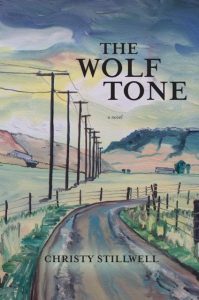Working with Opposites
 Writing my first published novel, The Wolf Tone, I found myself inside a nest of opposing ideas. From the book’s general theme to the characters’ dissimilar ages, every idea seemed to have a counterpart.
Writing my first published novel, The Wolf Tone, I found myself inside a nest of opposing ideas. From the book’s general theme to the characters’ dissimilar ages, every idea seemed to have a counterpart.
I didn’t exactly plan this. I did not draft the book thinking: I know! I’ll work with incompatible themes and characters who are opposite in every way and see what happens! In fact, I was two drafts in, years in, before I caught on to any sort of design. Now that the book is out and I have some distance, I can see how these intersections helped me overcome my resistance to conflict.
I wrote two novels and was toying with the ideas that would become The Wolf Tone before I understood my fear of conflict. I didn’t want anything bad to happen to the characters I’d grown to love. In real life, I avoid conflict whenever possible, so catching myself dodging confrontations in my work wasn’t a total surprise. As I set out to write this third book, I vowed to look conflict straight in the eye and lean into it. I was going to let confrontation happen, allow the drama to unfold. I was determined to be brave.
My novel involves the disastrous collision between a classical musician and a drug dealer. In this regard, the book pivots around an age-old conflict: high and low culture. Margot Fickett, my protagonist, is the principal cellist for a college town symphony orchestra. Dutch, the novel’s antagonist is a mysterious west coast man in town to invest in Montana’s burgeoning medical marijuana industry.
By mixing characters from differing worlds, I was sure to create drama. I suppose I’m talking about class, in a way. A trained musician, no matter her childhood background, is bound to have an education and with that education, certain values and ideas about the “right” way to live. A dope dealer may or may not have an education, but he’s going to have a much looser notion about the “right” way to live.
Writing about class contains an inherent risk of stereotype. High and low culture are concepts, after all, constructs that are difficult to firmly define without relying on received ideas and tired assumptions. The best way to avoid banal stereotype is to get specific. I avoided making Margot Fickett a classical music puppet by exploring her flaws. She lives in contradiction. She’s married to a blue grass musician, for example. She likes solitude but craves performance.
She loves her son but is ambivalent about being a mother. I faced the same challenge in developing the pot growers in my story. Sully Stiles is the master grower behind Dutch’s medical marijuana business, the operation at the heart of the novel. I knew that if Sully was anything like the standard stoner, a lá Fast Times at Ridgemont High, the whole novel would slip into parody. As soon as I started writing about Sully, I knew he was anything but a stoner. He’s a pot grower who is also a single dad, a veteran of Afghanistan, a worrier, a man capable of love.
Existing within the outer bracket of high and low culture was a smaller system of opposites. The concept of parenting, for instance. In the first chapter, Margot is approached by twenty-year-old Eva Baker, a tattooed energetic single mother who claims that her three-year-old is Margot’s grandson. As Margot struggles with this information—her son Benji is a nerdy violin prodigy away at school—she and Eva begin to spend time together.
Their conflicting approach to parenthood is obvious: Margot gave up her musical career to raise her son with discipline and a strident value system, while Eva takes life as it comes. She’s not without ambition, but her plans are based in magical thinking. Midway through the book, for instance, Eva decides to sell her condo for cash and rent a drafty retail space, living in back with her toddler, a hot plate and a futon.
Because the world contains as many views on parenting as it does parents, I found myself with a story teeming with tension. All the characters in my novel, with the exception of Dutch, were parents. The conflict crackled. And it was fun. Instead of spending my energy dodging the confrontations, this time I had to work hard to write scenes with realistic, not stereotypical, outcomes. Thematic questions were brought up and explored, but not neatly answered. I made a mess. So long as the story compelled readers to keep reading, a mess was okay. A mess was a triumph!
Finally, nested inside the two outer systems of opposites was the extreme difference in the two characters’ ages. A twenty-year-old woman and a forty-eight-year-old woman were bound to clash, especially on the subject of marijuana. In fact, they didn’t see eye to eye on much of anything, including casual sex, accidental pregnancy, and abortion. Yet they liked one another. Again, dramatizing this—showing the women understanding and beginning to like one another—was fun. I’m thinking in particular of a scene in which Margot and Eva visit a clinic for the paternity test that will determine if Eva is owed child support monies.
The decision about perspective was wrenching; I wanted to know both their feelings, but I wrote the novel using omniscience with a constraint: each chapter held one perspective only. In this scene, I went with Eva. She leads Margot across the anti-abortion picket line outside. In the waiting room, Eva is awed by Margot’s ability to sit still, in silence.
When Eva begins her barrage of questions, I was able to convey in dialogue a softening in Margot’s replies, her half-smiling amusement, and finally her concerned questions in regards to Eva’s background. Again, I can’t fully express the pleasure I found in this kind of muffled boil, the tension between these two women by virtue of their differing perspectives. It seemed impossible that they could grow to care about one another and yet I knew they would.
Through trial and error, writing and re-writing scenes, I ensured that their connection came slowly and felt genuine. The challenge was fun.
This is somewhat ironic to me since one of the themes I explore in the book is the concept of fun. Margot and her husband, both serious musicians who understand that work and practice make them good at what they do, debate the concept of fun. Andy Fickett gave up classical music because it was no fun; the audience doesn’t dance or even clap. Margot views music as work, an opportunity to be great, which has very little to do with fun. As a writer, muscling my way through scene after scene of conflicting themes, incompatible approaches to parenthood, and contrary perspectives of age was, in fact, fun. Maybe not a-day-at-the-waterpark fun, but enjoyable in that satisfying way courage and fortitude always produce. I can hardly wait to try it again.
—
Christy Stillwell is the author of THE WOLF TONE (January 8, 2019; Elixir Press) and the poetry chapbook AMNESIA (2008; Finishing Line Press). She is the winner of the Elixir Press Fiction Prize, a finalist in the Glimmer Train Short Story Contest and the recipient of a Pushcart Prize nomination, a residency at Vermont Studio Center and a Wyoming Arts Council Literary Fellowship. Her stories and essays have appeared in journals such as Pearl, River City, Sonora Review, Sou’wester, The Massachusetts Review, literarymama.com, and The Tishman Review. You can visit her online at ChristyStillwell.com.
About THE WOLF TONE
 THE WOLF TONE won the Elixir Press 2017 Fiction Award. This novel, set in a Montana college town, takes us on a journey through such issues as motherhood and freedom, accompanied by a buoyant soundtrack like no other. Debra Spark had this to say about it: “For me, Christy Stillwell’s novel THE WOLF TONE was like a wonderful vacation to a beautiful, arty Montana town, where I got to live for a season among musicians, art patrons, locals, and owls. I met a tough-minded single mother, a solitary classical musician, and a vet with a start-up medical marijuana dispensary. By the time my stay was over, I’d heard the unexpected and profound story of these unlikely literary bedfellows, a resonant tale about the choices we make, the secrets we keep, and our (often misguided) expectations regarding love, children, and career. No Airbnb booking required.”
THE WOLF TONE won the Elixir Press 2017 Fiction Award. This novel, set in a Montana college town, takes us on a journey through such issues as motherhood and freedom, accompanied by a buoyant soundtrack like no other. Debra Spark had this to say about it: “For me, Christy Stillwell’s novel THE WOLF TONE was like a wonderful vacation to a beautiful, arty Montana town, where I got to live for a season among musicians, art patrons, locals, and owls. I met a tough-minded single mother, a solitary classical musician, and a vet with a start-up medical marijuana dispensary. By the time my stay was over, I’d heard the unexpected and profound story of these unlikely literary bedfellows, a resonant tale about the choices we make, the secrets we keep, and our (often misguided) expectations regarding love, children, and career. No Airbnb booking required.”
Category: On Writing
























